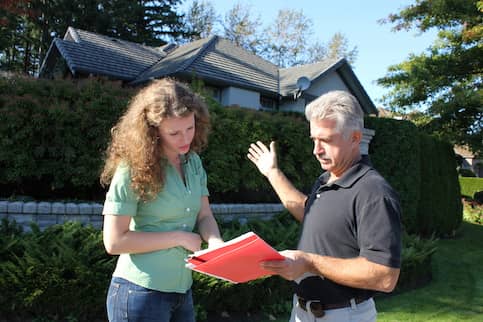In a competitive market with abundant offers above asking price, first-time home buyers and seasoned house hunters alike need to consider any and all strategies that will help their offer stand out amongst the rest. An earnest money deposit (EMD) can be just what you need to instill confidence in your seller and show how serious you are about purchasing the property.
If you’re financing your new home with a VA loan, it’s important to know the requirements regarding earnest money deposits before you decide whether it’ll be beneficial for you. Here’s what you need to know about earnest money and the VA home buying process.
See What You Qualify For
You can get a real, customizable mortgage solution based on your unique financial situation.
What Is An Earnest Money Deposit?
An earnest money deposit is a gesture of good faith from the buyer to the seller in a real estate transaction. It’s a cash deposit, typically in the form of a personal or certified check, and its dollar amount varies depending on a number of external factors like state and market conditions. It protects the seller from any financial loss should the transaction fall through by compensating for any wasted time.
The deposit is usually held in escrow by a neutral third party until the transaction is finalized. Once finalized, the money will go toward the buyer’s closing costs or down payment. If the buyer backs out or their mortgage falls through, the seller may keep the funds.
See What You Qualify For
Buy A Home
Discover mortgage options that fit your unique financial needs.

Refinance
Refinance your mortgage to have more money for what matters.
Tap Into Equity
Use your home’s equity and unlock cash to achieve your goals.
Do You Have To Pay Earnest Money For A VA Loan?
An earnest money deposit is not required when buying a home with a VA loan. However, the seller may require an earnest money deposit as part of an offer in order to be considered. This minimizes risk on their end and demonstrates the buyer’s goodwill and seriousness about buying. Even if it’s not required by the seller, you may still decide that the deposit will strengthen your offer, especially in a seller’s market.
Other VA Guidelines For Earnest Money Deposits
Should you decide to offer an earnest money deposit, the VA requires that the money comes from you rather than borrowing it or receiving it as a gift. The VA will verify the source of your earnest money deposit. The VA will also require that the home meets minimum property requirements (MPRs) before approving a VA home loan.
If the property does not meet these standards, the buyer will not get VA loan approval until the conditions are repaired or improved. Knowing this, buyers should include clear language around this contingency in their purchase agreement so that the EMD is refundable if the house fails the VA appraisal process.
Should You Offer An Earnest Money Deposit For A VA Loan?
Before you offer earnest money with a VA loan, it’s important to consider market conditions and weigh the benefits and risks.
Benefits Of Earnest Money For VA Loans
Here are some of the benefits of offering an earnest money deposit:
- EMDs can help your offer stand out in a seller’s market.
- EMDs are good faith deposits, which can strengthen your relationship with the seller and lead to more favorable contract terms.
- It’s one of few upfront costs aside from VA funding fees, considering VA loans usually don’t require a down payment from borrowers or private mortgage insurance (PMI), and closing costs can be covered by the seller.
Risks Of Earnest Money For VA Loans
On the other hand, there are some risks involved with earnest money and VA loans:
- You bear the risk of losing your money if you break any contract terms.
- You bear the risk of losing your money if you don’t close within the designated time frame.
- If for any reason you decide you have a change of heart and don’t want to buy the home, you could lose the earnest money deposit.
When Are Earnest Money Deposits For VA Loans Refundable?
So in which situations can you get your earnest money back as a buyer? If contingencies laid out in your purchase agreement are not met, you may be able to get your money back. For example, if a home inspection reveals costly repairs, the buyer can request the seller assume responsibility for those projects prior to closing. If they don’t agree or the buyer is not happy with the repairs, the buyer can back out of the contract if a home inspection contingency is clearly written.
Another situation where an EMD is refundable is if a home appraisal comes back significantly lower than the purchase price of the home. If you’re unable to negotiate a lower purchase price with the seller, you can back out and get your EMD back.
On the buyer’s end, you can also include a contingency in the contract to protect your earnest money deposit if your financing falls through unexpectedly. To avoid any financing uncertainties, many sellers require an initial approval from a verified lender to prove a buyer’s likelihood of getting approved.
How Much Earnest Money Is Necessary For A VA Loan?
In short, market conditions will determine how much earnest money you should offer with your VA home loan. Typically, an earnest money deposit equates to 1% – 3% of the purchase price of a home. In a seller’s market with lots of buyer competition, you might offer even more. With less competition, you might be able to offer on the lower end.
The amount you can afford to offer will depend on the purchase price of the home, interest rates and other market conditions. Your real estate agent can help you decide how much earnest money will give you the best chance of getting your offer accepted.
The Bottom Line: Earnest Money Isn’t Required For VA Loans, But It Can Help Buyers
Though an earnest money deposit is not a requirement when buying a home with a VA loan, it can still be a helpful tool to get your offer noticed and accepted. Depending on the seller’s standards, your budget and market conditions, you and your real estate agent might determine that an EMD is worth the cost.
If you’re an eligible veteran, active duty service member or surviving spouse planning to buy a new home, explore your VA loan options today.
Take the first step toward buying a house.
See what you qualify for.

Victoria Araj
Victoria Araj is a Staff Writer for Rocket Companies who has held roles in mortgage banking, public relations and more in her 15-plus years of experience. She has a bachelor’s degree in journalism with an emphasis in political science from Michigan State University, and a master’s degree in public administration from the University of Michigan.












